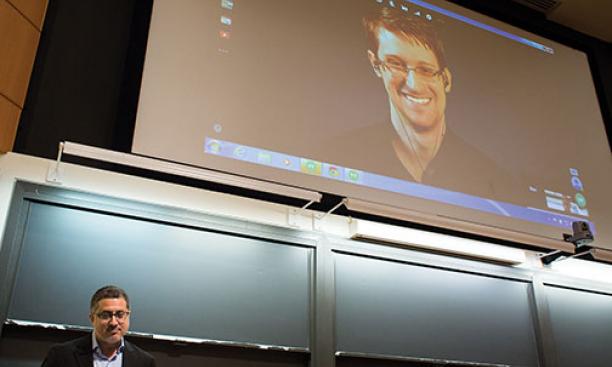

Citizens must assert their right to privacy in the face of vast government surveillance efforts, former National Security Agency contractor Edward Snowden told a large Princeton audience last month. Snowden, who gained temporary asylum in Russia in 2013, appeared via video link, his face projected onto a giant screen as he gazed into a webcam in Moscow.
Snowden arrived in Russia soon after leaking to journalists a trove of classified documents revealing that the American government was secretly collecting vast quantities of data on telephone and Internet use. He faces criminal espionage and theft charges that could send him to prison for decades.
More than 350 people packed the Friend Center auditorium and spilled into two nearby overflow rooms May 3 to hear Snowden, a boyish-looking 31-year-old in rimless glasses, interviewed by Pulitzer Prize-winner Barton Gellman ’82, a Woodrow Wilson School lecturer and one of the journalists who received Snowden’s leaks.
Audience members, many of them current or former Princeton students, asked Snowden about the NSA programs whose existence he revealed and sought his advice on how citizens could protect threatened freedoms.
“Defend your right to encryption and your right to privacy,” Snowden urged. “Rights aren’t really granted by governments. These are things that are inherent to human nature. If the government wants to intrude on your rights, you don’t have to justify why you need [those rights]. You make it incumbent on them to justify their intrusion into your rights.”
About 100 people stayed on for an afternoon conference, “Now That We Know: Technology, Law, Journalism, and Policy After Snowden,” listening as a dozen experts discussed the implications of the Snowden revelations. The day’s events were co-sponsored by the Center for Information Technology Policy, the Program in Law and Public Affairs, and the Wilson School.
Conference speakers agreed that Snowden’s disclosures, coupled with new legal pressures on journalists and their sources, have remapped the world of electronic privacy, pushing everyone from technology companies to newspaper reporters to adopt new methods of protecting data from government scrutiny.
The event took place the week before a federal appeals court in New York ruled that the NSA’s bulk collection of Americans’ phone records was illegal.
Gellman, the lead speaker on the conference’s journalism panel, said he spends more and more time covering his tracks — encrypting communications or leaving cell phones and GPS devices behind when he meets with sources. “When you treat talking to a source as a kind of espionage, then you force reporters to try to learn how to behave more like spies,” he said.
And ongoing government efforts to dilute encryption protocols by requiring technology companies to build in “back-door” access to coded communications will ultimately weaken Internet security for Americans and empower repressive governments around the world, conference speakers said.
Snowden’s disclosures point up the need for computer scientists to involve themselves in influencing public policy on surveillance, said Jonathan Mayer ’09, a lawyer and computer science graduate student who is a fellow at Stanford University’s Center for International Security and Cooperation.
“Good surveillance law requires good technical understanding,” Mayer said. “I don’t think the problem is rule-breaking. I think the problem is that the rules themselves are deeply broken.”
Even the NSA has not argued strongly against a bill, pending in Congress in mid-May, that would tighten post-9/11 rules governing the bulk collection of data, conference speakers said, since little or no evidence indicates that this mountain of data has yielded any nuggets of useful information.
In his conversation with Gellman, Snowden said that mass surveillance of electronic communications compromises fundamental American values without making the country safer.
Compiling massive databases of so-called “metadata” about communications — such details as when and where a telephone call was made, or how long it lasted — gives security services access to information about millions of people who are not suspected of any crimes, he noted.
“That’s called pre-criminal investigation, and that’s never been a standard in any liberal democracy,” Snowden said. “They’re not wrong that it would give them an investigative advantage, but that’s not the way that liberal societies work.”
